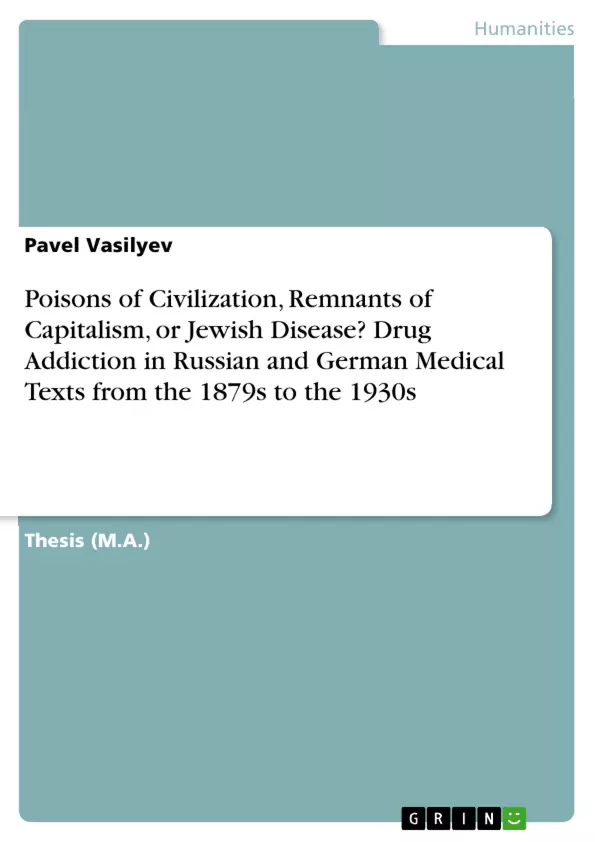This thesis looks at Russian and German medical texts related to recreational drugs that were written in the period that witnessed the emergence of drug addiction as a social problem (late 19th – early 20th centuries). An important part of the argument is the analysis and critique of primary sources that I undertake in order to investigate various theories, images, and practices related to drug addiction.
This work shows how drug addiction was eventually constructed as a social problem related to modernity, capitalism – and Jewishness. Drug addiction research appears to be one of the attractive fields for Jewish scientists, who used this opportunity to contemplate, negotiate, and re-define the new Jewish identity in a rapidly changing modern world. As evident from the analysis of the solutions proposed in medical texts and their influence on practical drug policy, medical science in both Russia and Germany (though with substantial variations due to political, cultural and scientific differences) played a major role in marginalizing and repressing drug addicts while rejecting other emerging alternatives.
Inhaltsverzeichnis (Table of Contents)
- Introduction
- Chapter 1: Medical Texts and their Authors:
- Description of Medical Texts
- Personalities of Authors
- Dilemmas of Jewish Doctors
- Chapter 2: Poisons of Civilization?
- Social Context of the Problem in the Late 19th and Early 20th Centuries
- Medical Theory Around Fin-de-Siècle
- Origins of Drug Addiction
- Images of Drug Addicts
- Possible Solutions
- Chapter 3: Constructing the Social Problem:
- Radical Changes in Russia and Germany, 1914-1922
- Medical Theory after the First World War
- Origins of Drug Addiction
- Images of Drug Addicts
- The Ways of Solving the Social Problem
Zielsetzung und Themenschwerpunkte (Objectives and Key Themes)
This thesis examines Russian and German medical texts on recreational drug use during the late 19th and early 20th centuries, a period marked by the emergence of drug addiction as a societal issue. The work analyzes primary sources to investigate various theories, representations, and practices related to drug addiction.
- The historical and social context of drug addiction in Russia and Germany
- The role of Jewish doctors in the development of drug addiction research and medical practice
- The medical theories and understandings of drug addiction during the late 19th and early 20th centuries
- The construction of drug addiction as a social problem related to modernity, capitalism, and Jewishness
- The impact of medical science on the marginalization and repression of drug addicts
Zusammenfassung der Kapitel (Chapter Summaries)
The first chapter explores the nature and characteristics of the medical texts analyzed in the thesis, providing a critical overview of the authors and their motivations. It also examines the unique position and challenges faced by Jewish doctors in the medical field during this time.
Chapter 2 delves into the social context of drug addiction in Russia and Germany from 1871 to 1914. It examines medical theories around the turn of the century, including the origins of drug addiction, the perceived characteristics of drug addicts, and proposed solutions to the problem.
Chapter 3 focuses on the development of drug addiction as a social problem in Russian and German medical texts from 1914 to 1933. It explores the radical changes in both countries after World War I and examines the evolving medical understanding of drug addiction, including its causes, representations, and proposed solutions.
Schlüsselwörter (Keywords)
Drug addiction, medical texts, Jewish doctors, social problem, modernity, capitalism, Russia, Germany, medical theory, marginalization, repression, fin-de-siècle, World War I.
Frequently Asked Questions
How was drug addiction constructed as a social problem?
In the late 19th and early 20th centuries, medical texts in Russia and Germany began linking drug addiction to modernity, capitalism, and even ethnic identities like "Jewishness."
What role did Jewish doctors play in addiction research?
Jewish scientists were prominent in the field, often using their research to negotiate and redefine Jewish identity within a rapidly changing modern world.
What were the "Poisons of Civilization"?
This term refers to the fin-de-siècle medical view that recreational drugs were a negative byproduct of urban progress and the stresses of modern life.
How did World War I change the medical view of addiction?
The war led to radical changes in social structures, resulting in more repressive medical theories and policies that marginalized addicts in both Russia and Germany.
Did medical science help or harm drug addicts during this period?
The thesis argues that medical science played a major role in marginalizing and repressing addicts by pathologizing them and rejecting alternative, more humane solutions.
- Quote paper
- Pavel Vasilyev (Author), 2010, Poisons of Civilization, Remnants of Capitalism, or Jewish Disease? Drug Addiction in Russian and German Medical Texts from the 1879s to the 1930s, Munich, GRIN Verlag, https://www.grin.com/document/153970



